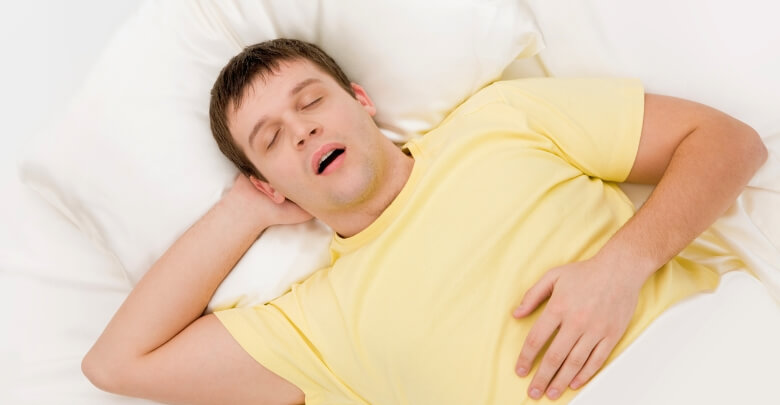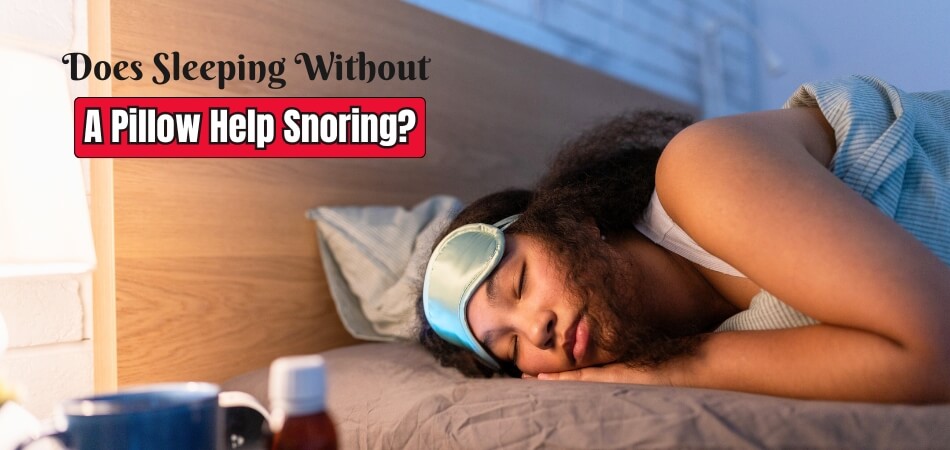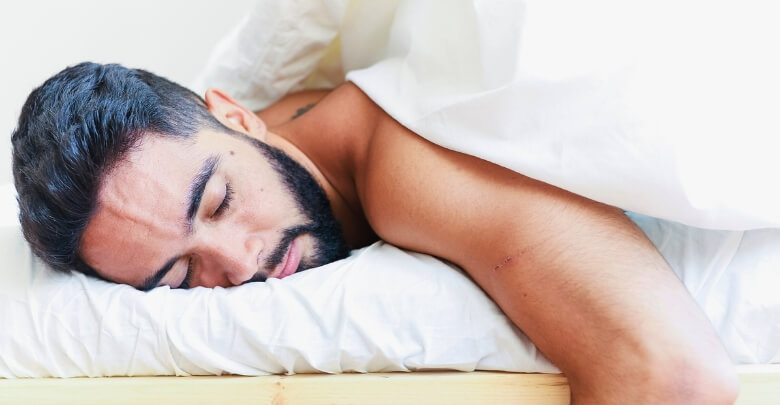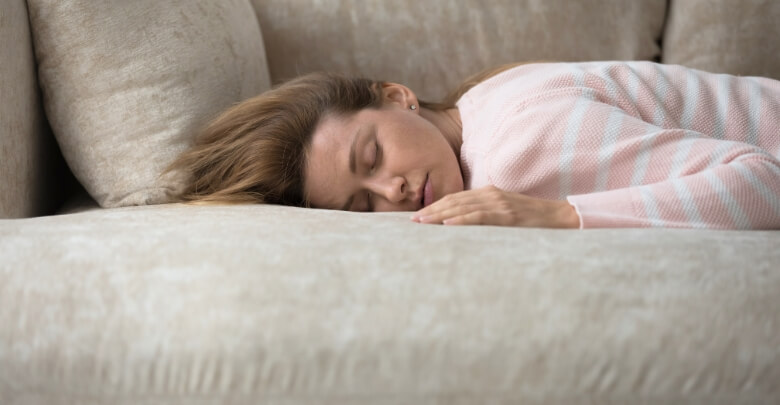Pillows are a staple in most bedrooms, prized for their role in enhancing comfort and supporting proper sleep posture. However, they may also play an unexpected part in one of the most common sleep disturbances: snoring.
Snoring disrupts sleep for millions worldwide but also significantly impacts overall health and rest quality. This brings us to an intriguing question: “Does sleeping without a pillow help snoring?”
Surprisingly, ditching the pillow might be beneficial. For some, removing the pillow can improve airway alignment, resulting in less snoring by preventing constriction.
To understand how this simple change can lead to a quieter night’s sleep and explore alternative sleeping positions and their effects, continue reading our detailed exploration.
Snoring Basics: Identifying What Causes It
Snoring is a common condition that affects many people worldwide, characterized by noisy breathing during sleep. It occurs when the flow of air through the mouth and nose is partially obstructed during sleep.

Several factors can contribute to this blockage. Anatomical variations like a deviated septum or enlarged tonsils, lifestyle choices such as alcohol consumption or obesity, and even sleep position can play significant roles in whether or not a person snores.
A gadget such as the Chill Pill can help mitigate snoring by adjusting sleeping positions or providing other supportive functions. Additionally, managing environmental factors and personal health can significantly reduce snoring frequency and intensity.
The ability to identify these triggers is essential for pinpointing effective treatments and making lifestyle changes that promote better sleep. This knowledge enhances sleep quality, overall health, and daytime functioning.
Does Sleeping Without a Pillow Help Snoring?
Frequently, people stumble upon snoring, a sleep disturbance that impacts their health and sleep quality. One intriguing approach to reducing snoring involves pillows-or rather, none. The question “Does sleeping without a pillow help snoring?” may seem simple, but the answer is quite nuanced.

The removal of the pillow might improve airway alignment and decrease snoring for some. As a result of raising the head, the airway can be constricting. It may help to explore different sleeping positions and alternatives to traditional pillows, though the effectiveness varies from person to person.
Here are the key factors that determine this phenomenon.
Airway Alignment
When you sleep without a pillow, your neck and head lie flat, which aligns the airways more naturally. This alignment might reduce the constriction when the head is elevated by a pillow. For those with certain anatomical characteristics, this could lead to a noticeable reduction in snoring.
This method is not one-size-fits-all. Individual differences in neck length and spinal alignment can influence whether sleeping without a pillow is beneficial or not. You can get personalized advice when you consult a healthcare provider.
Pillow Alternatives and Sleeping Positions
Experimenting with different pillow alternative can also be beneficial. Adjustable pillows, for example, allow changes in height and firmness to better suit individual preferences and needs. Such flexibility can help find an optimal position that reduces airway obstruction.
Sleeping positions play a crucial role in sleeping without a pillow. Whether or not they use a pillow, some people find that sleeping on their sides reduces snoring. Try out different combinations and see which leads to the best results for your sleep and snoring.
A good place to start is by considering the type of pillow and your sleep position. You can make informed decisions about gadgets that will best suit your needs by visiting Info Gadgetians for comprehensive reviews and information on sleep-enhancing gadgets. By managing snoring holistically, you can sleep better and wake up more energized.
Benefits of Sleeping Without a Pillow: Beyond Snoring Reduction
Many of us reach for a pillow as a staple for a good night’s sleep, but what if forgoing one could offer unexpected benefits? Besides reducing snoring, sleeping without a pillow has other significant benefits. For some, ditching the pillow could improve sleep quality and spinal alignment. Here are the benefits briefly described.

Improved Spinal Alignment
Sleeping without a pillow can promote natural spine alignment. This neutral position reduces stress on your neck and back. Over time, this can lead to fewer aches and pains upon waking.
A pillow can sometimes lift the head too much, causing unnatural neck bends. During sleep, your body lies flatter and aligned, resulting in better posture. This can be particularly beneficial for those with chronic back or neck pain.
Enhanced Sleep Quality
Removing the pillow might improve your sleep quality. A flatter sleeping position can lead to better breathing and less discomfort during the night. Many people find that without the extra elevation, they experience fewer interruptions.
Users of CPAP can benefit from this change as it stabilizes the neck and airways, increasing effectiveness. Such adjustments might complement the CPAP machine’s sleep disturbance monitoring. The overall effect is deeper, more restful sleep.
Reduced Facial Acne and Wrinkles
Sleeping without a pillow may also benefit your skin. Direct contact with a pillowcase, especially one not changed frequently, can exacerbate acne. The absence of a pillow reduces this risk by minimizing skin contact with fabric that harbors oils and dirt.
Additionally, your face is less stressed when you don’t use a pillow. This reduction can prevent sleep lines and wrinkles, promoting smoother skin over time. Sleeping pillow-free supports your spine and enhances your skin health.
Tips for Better Sleep: Pillow Alternatives and Positioning
For physical and mental health, getting a good night’s sleep is essential. Changing sleeping positions and exploring pillow alternatives can improve your sleep quality. These tips might help you reduce back pain, reduce snoring, or have a more restful sleep.

Pillow Alternatives
- Adjustable pillows: Customize the height and firmness to suit your sleeping preferences.
- Rolled-up towels: Provide customizable neck support without traditional pillows.
- Orthopedic pillows: Specifically designed to maintain your neck and spine’s natural curve.
- Buckwheat pillows: Conform to your shape and offer excellent support with natural breathability.
- No pillow at all: Especially beneficial for back sleepers aiming for optimal spinal alignment.
Positioning Tips
- Side sleeping: Consider a firm pillow between your knees to align your hips and reduce lower back strain.
- Back sleeping: A thin pillow under your knees can help maintain your spine’s natural curve.
- Stomach sleeping: Try a very thin pillow or none at all to keep your neck in a neutral position.
- Raise your head: Use a wedge pillow to elevate your upper body, reducing acid reflux and snoring.
Trying these alternatives and positioning strategies can help you create a sleeping environment that suits you. A personalized approach can help you wake up feeling refreshed.
FAQs About Does Sleeping without a Pillow Help Snoring?
It might seem strange, but sleeping without a pillow may have benefits, particularly for snorers. Let’s dive into some frequently asked questions to understand more about this topic.
What Sleeping Position Reduces Snoring?
Positioning yourself on your side or stomach can reduce snoring. These positions prevent the tongue from falling back and blocking the throat, which can cause snoring.
is It Healthy to Sleep without a Pillow?
For people who sleep on their back, it may be healthier to sleep without a pillow. This can promote better spine alignment and reduce neck strain.
Can Sleeping without a Pillow Improve Neck Pain?
For some individuals, sleeping without a pillow can reduce neck pain by maintaining natural spine alignment. Experimentation is key as results vary based on personal anatomy.
How Does Pillow Height Affect Snoring?
A higher pillow can tilt the head forward, constricting the airway and increasing snoring. A lower or no pillow might help keep the airway open.
Are There Any Drawbacks to Sleeping without a Pillow?
Some people might experience discomfort or a worsening of symptoms, including lower back pain or sleep disturbances. It’s advisable to monitor any changes and adjust as necessary.
Last Words
We’ve discussed how sleeping without a pillow might reduce snoring by promoting better airway alignment. This simple adjustment can make a significant difference for some individuals, as it helps to prevent airway constriction that often occurs with head raising.
In other words, does sleeping without a pillow help snoring? For many, yes it does. To maximize the benefits, experiment with different sleeping positions to see what works best for your body. Embracing these changes could lead to a quieter, more restful night and improve your overall sleep quality.






